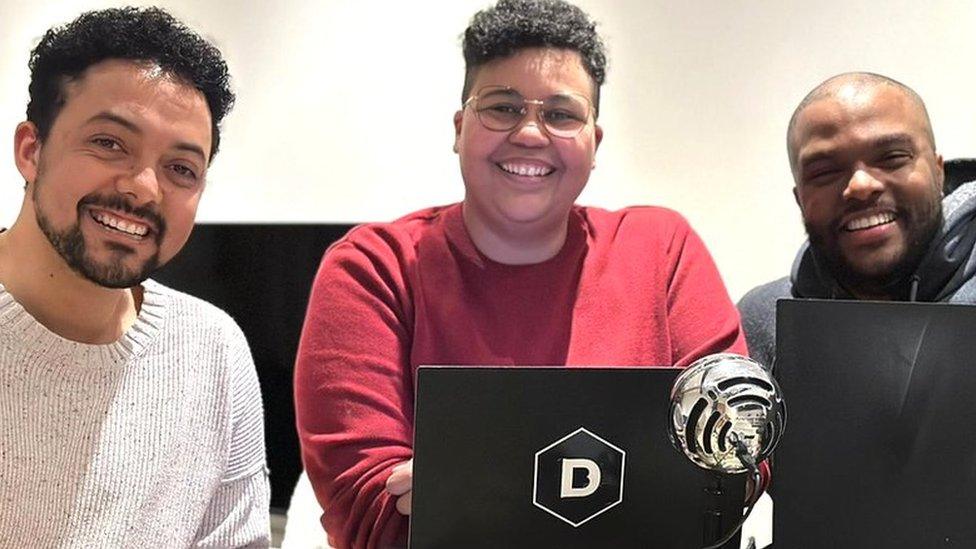London Games Festival shines a light on diversity
- Published

Jerreau Henry says he was used to seeing stereotyped black characters in games growing up
This year's London Games Festival has begun, and one of its headline features is the Ensemble initiative.
Each year, organisers select eight games industry creatives from under-represented backgrounds to highlight the work they do.
BBC Newsbeat spoke to two of those selected - designer Rafif Kalantan and marketing manager Jerreau Henry - to find out more.
Jerreau works for UK developers Electric Square and Lively Studio, and has chaired diversity initiatives for both.
Rafif's final-year master's project - Eros Xavier's Love Solutions - was a puzzle game about a cynical cupid who tries to break up couples and earned her a Student Bafta.
She's also a founder of GIGS (Gamedev Initiative for the Global South), which focuses on providing resources to up-and-coming developers in the Middle East and Asia.
Both got into games young, by playing classics such as Doom, Tomb Raider and Sonic the Hedgehog on family computers and consoles.
But as they grew up and games advanced they both noticed that their own experiences weren't accurately reflected.
Jerreau says he was used to seeing stereotypes - "a dancer... a super-angry black character".
"I used to feel like this character doesn't feel at all authentic and thinking, 'oh, my goodness, so many people are going to see that and that's what their perception is going to be, potentially, of the particular group of people'," he says.

Rafif Kalantan says the portrayal of Middle Eastern characters in mainstream games has often been unfavourable
Rafif, who's originally from Saudi Arabia, says she got used to games failing to portray the "rich, deep history" of the Middle East.
"A lot of video games mainly portray Arabs as either terrorists or in a constant state of war, which is really unfair," she says.
"There's more to the region than just the bad things that end up happening."
The games industry has been making more efforts to accurately reflect different cultures and identities, either by hiring consultants or recruiting staff from different backgrounds.
This has sparked backlash from some, who claim that game developers are being forced to shoehorn diversity into their games.
But Jerreau says he believes "game studios have a responsibility to authentically represent different cultures".
"It's not just a matter of, 'hey, we're super-woke, and we are trying to ruin all your games," he says.
"I don't think I've spoken to many people who aren't very passionate about trying to create a more diverse landscape in the games industry."
Jerreau admits there "is a balance" to be struck and says he can appreciate the potential for upset when developers make changes to well-known characters.
"I do think that it's important to have dialogue and that's something that's going to be helpful for the industry to move forward," he says.

Rafif's master's project - about a cynical "reverse cupid" - won her a student Bafta
Rafif says she's witnessed progress, and singles out Ubisoft's latest Assassin's Creed game, Mirage, for its "really amazing work" in recreating 9th Century Baghdad.
She says the game, which had an Arabic dialogue option, involved research from museums based in the region and was a good example of "involving consultants early on and trying to represent the minority in your game in a better light and more accurately".
There's also another good reason for games developers pay more attention to representation.
"It's not just about ticking a box, it's also financially beneficial to have more diversity," says Jerreau.
The industry has seen huge numbers of job losses over the past 18 months, and analysts believe it will need to appeal to newer audiences in Latin America, Africa and the Middle East to keep growing.
That strengthens the case for making sure the people making the games understand those audiences, according to Jerreau.
"Because more people actually play them, can relate to them, hiring more diverse talent, they're able to contribute so much to the games and the culture as well," he says.
"When you have areas of difference, I think that has a huge benefit, because it allows for different ideas."
Rafif believes projects like Ensemble help to encourage a wider range of people into the industry, by providing visible role models.
"I think that's very important, in order to show that there are success stories that people can look up to, and find that encouragement," she says.
"And also, it's just really important to be able to showcase the stories of minorities straight from them instead of hearing it from someone else."
The London Games Festival runs from 9 April to 25 April.


- Published17 June 2023

- Published17 February 2024
